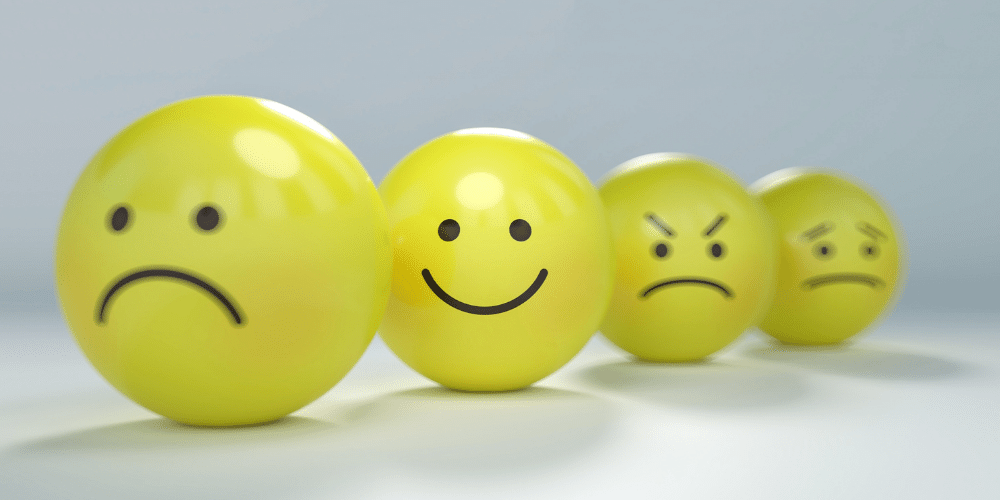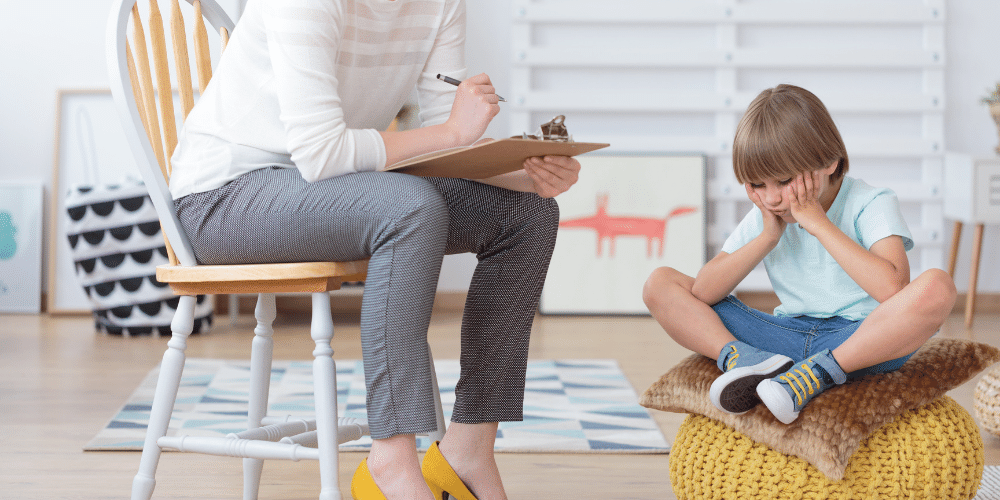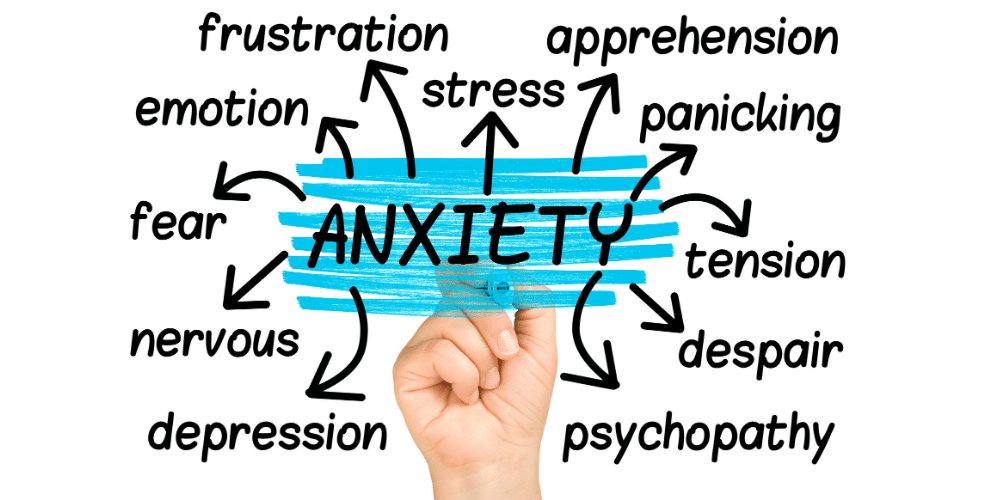Anxiety itself is a natural response to any kind stress from human body, sometimes it is a healthy emotion but sometimes it can channel itself into depression and fear. The continuous fear of feeling what is about to come.
Your body’s normal reaction to stress is anxiety. It is a feeling of hopelessness and fear or the feeling of depression for what is to come or what will happen. Most people are scared and anxious on the first day of school, going to a job interview, or delivering a speech.
However, you might have an anxiety disorder if the anxiety is serious and your feelings of anxiety reach up to an extreme, lasts longer than six months, and interferes with your life.
What actually are anxiety disorders?
Moving to a new place, beginning a new career, or taking a test can all cause anxiety and this feeling is quite normal. While this form of anxiety is stressful and it may feel unpleasant, it can do good to you at times. It can inspire you to work harder and achieve better results. Ordinary anxiety is a transient emotion that does not interfere with your daily activities.
If you have an anxiety disorder, you can experience fear all of the time and it may look like it never goes away. It is intense and can be devastating most of the times.
This form of anxiety can cause you to abandon activities that you enjoy or once used to enjoy. It may prevent you from entering an elevator, crossing the street, or even leaving your home in extreme cases. If anxiety is not treated, it can get even worse.
Anxiety disorders are the most common form of mental illness and emotional disorders, affecting people of all ages. Women are more likely to be affected as compared to men to be diagnosed with anxiety disorders, according to the American Psychiatric Association.

However, there is a little difference between normal anxiety and anxiety disorders and people with anxiety disorders often have intense, excessive, and persistent worry and fear about everyday situations and eventually it becomes an expected part of life.
What are the different kinds of anxiety disorders?
Anxiety plays a role in a variety of disorders. These include:
Panic disorder:
Panic disorder is characterized by recurrent panic attacks that occur at inconvenient times. An individual suffering from panic disorder can live in constant fear of having another panic attack.
Phobia:
an abnormally strong aversion to a particular entity, or a place, circumstance, or behavior.
Social anxiety disorder:
Extreme fear of being viewed or judged by others in social settings is a symptom of social anxiety disorder.
Obsessive-compulsive disorder (OCD):
Obsessive-compulsive disorder (OCD) is characterized by repetitive irrational thoughts that contribute to the repetition of specific behaviors.
Separation Anxiety disorder:
separation Anxiety disorder is characterized by a fear of being away from home or of a loved one being sick.
Illness Anxiety disorder:
Illness Anxiety disorder is characterized by worry about one’s health (formerly called hypochondria)
Post-traumatic stress disorder (PTSD):
Anxiety after a traumatic experience is known as post-traumatic stress disorder (PTSD).
Sign and Symptoms of Having Anxiety
Anxiety manifests itself in a variety of ways depending on the individual experiencing it. From butterflies in your stomach to a pounding heart, you can experience a variety of emotions. You might feel out of balance, as though your mind and body are not communicating.
Nightmares, panic attacks, and painful thoughts or experiences that you cannot handle are some of the other reasons people experience anxiety. You may have a general feeling of insecurity and fear.
Everyone feels anxious now and then but when the continuous feelings of anxiety and panic interfere with daily activities, they become excessive fear or worry. These feelings become difficult to control are out of proportion to the actual danger and they can last a long time.
The symptoms of having anxiety disorders may start during childhood or the teen years and continue into adulthood but it does feel different depending on the person experiencing it. The symptoms of anxiety may differ among individuals. Some might feel their heart racing others might feel butterflies in their stomach. Some of these signs are,
- Feeling nervous or tense.
- Feelings of imminent risk, fear, or impending disaster or a kind of tragedy.
- Facing concentration difficulties or going blank.
- Having sleep disorders, such as problems in falling or staying asleep.
- Impatience and a feeling of always being “on-edge.”
- Uncontrollable feelings of worry.
- Being easily fatigued and irritated.
What are the main triggers of Anxiety?
Until now, it is undiscovered what really causes anxiety disorders, but it is complex mix of things and feelings that play a role in who does and does not get one.
Such as anxiety symptoms differ among individuals so does the causes because of different life experiences itself. They play an important role having anxiety disorders, such as traumatic events appear to trigger anxiety disorders in people who are already prone to anxiety. Though, anxiety can also be an inherited trait.
Moreover, currently some researchers believe that some parts of the brain are responsible for controlling fear may be impacted with anxiety.
What is an anxiety attack?
An anxiety attack is characterized by a strong sense of worry, concern, depression, or fear. An anxiety attack can take a long time to develop for many people. As a stressful event approaches, it can escalate and worsen up.
Anxiety attacks may manifest in a number of ways, and symptoms can vary from person to person. That is because anxiety’s various symptoms don’t affect everyone, and they can evolve and change over time.
Common symptoms of an anxiety attack that many people experience include:
- feeling faint or dizziness
- shortness of breath
- dry mouth
- sweating continuously
- chills or hot flashes felt frequently.
- apprehension and worry
- agitation
- agony
- fear
- A feeling of numbness or tingling
Some people may get confused between a panic attack and an anxiety attack, but they are not the same even though they share the same symptoms.
How Anxiety can be diagnosed?
Having anxiety disorders is no like some medical or health issues that requires different kind of tests to be diagnosed. No lab tests can specifically diagnose anxiety disorders, but the symptoms can once your doctor examines you.
So if you feel like having serious anxiety disorders then it is important to counsel a doctor first so your doctor will consider how long you’ve had symptoms and how intense they are when diagnosing you.
How Anxiety can be treated?
Once you are diagnosed with Anxiety you can explore different treatment options that are suitable for you. For some individuals, medical treatment is not necessarily only lifestyle changes may be enough to cope with the symptoms so you can lead a more manageable day-to-day life. Whether the treatment for anxiety can be categorized in two ways, you can consult a therapist or psychologist who can help you learn and cope with your daily life strategies or maybe you just need an environmental change.
Are there tests that diagnose anxiety?
A single test cannot be performed to diagnose anxiety. Instead, an anxiety diagnosis requires is something that cannot be done that easily and is a lengthy process of physical examinations, mental health evaluations, and psychological questionnaires.
Some doctors may prefer to conduct a physical exam on you, including several blood or urine tests to rule out underlying or basic medical conditions that could contribute to the kind of symptoms that you are suffering from and feeling.
Several anxiety tests and scales are also performed that can assist your health care provider assess the level and stage of anxiety that you are going through.
What natural remedies are used for anxiety?
Changes in your lifestyle is an effective way that will help you alleviate some of the tension and anxiety you feel on a daily basis. The majority of natural “remedies” include taking care of your body, engaging in safe behaviors, participating in healthy activities, and avoiding unhealthy ones that may cause you harm.
These lifestyle changes include:
- getting enough sleep so that you can feel fresh.
- Meditation may be a very good way to relieve stress.
- staying active and exercising regularly
- Adopting a healthy diet
- Staying active on a daily basis and working out
- preventing alcohol
- avoiding caffeine as it can prove to be hazardous.
- quitting smoking cigarettes as it causes harm to your body.
If these lifestyle changes seem like a positive way to help you eliminate some anxiety, read about how each one works—plus, get more great ideas for treating anxiety.
If these lifestyle changes sound like a good and positive way to help you get rid of any anxiety, at i-kare treatment center, we work with our patients and help them learn more about how they work and get more great anxiety-relieving ideas which will help them live qualify life.
Anxiety and depression
You could be stressed and in extreme cases also depressed if you have an anxiety disorder. Although anxiety and depression may occur on their own, it is not uncommon for these two mental health conditions to coexist.
Anxiety may be a sign of major or clinical depression. An anxiety disorder may also contribute to the worsening of depressive symptoms and it can be triggered.
Symptoms of both conditions that an individual may experience can be controlled with many of the similar treatments: psychotherapy (counseling), medications, and certain lifestyle changes.
How to help children with anxiety

Anxiety is found to be a very normal and common phenomenon in children and usually many children experience this at least once in their life. Anxiety affects one out of every eight children.
Children usually develop the skills to relax themselves and deal with feelings of anxiety as they grow up and learn from their parents, peers, and caretakers and cope with this feeling.
Anxiety in young children, on the other hand, may become chronic and recurrent, leading to the development of an anxiety disorder. Uncontrolled anxiety may make everyday tasks difficult and may interfere with their daily life, and children can avoid engaging with their friends or family members and may prefer to remain isolated.
Symptoms of an anxiety disorder might include:
- jitteriness
- irritability
- sleeplessness
- feelings of fear
- shame
- feelings and likelihood of isolation
Anxiety treatment for children may consist of cognitive behavioral therapy (talk therapy) and certain medications.
How to help teens with anxiety
Teenagers can be anxious for a variety of reasons. These crucial years of an individual’s life are filled with tests, college visits, and first dates. Teenagers who are excessively anxious or exhibit anxiety symptoms may have an anxiety disorder.
Nervousness, shyness, isolationist habits, and avoidance are all symptoms of anxiety in teenagers. Similarly, anxiety in teenagers can lead to strange behaviors. They can misbehave, perform poorly in school, miss social activities, or even abuse drugs or alcohol.
Anxiety and depression can coexist in some teenagers. It’s important to diagnose both conditions so that treatment can resolve the underlying problems and alleviate symptoms.
Talk therapy and medicine are the most common therapies for anxiety in teenagers. These treatments also aid in the treatment of depressive symptoms.
Anxiety and stress
Anxiety and stress are both two sides of the same coin. Stress is triggered by demands imposed on your brain or body. It can be triggered by an event or behavior that makes you feel anxious or worried. Worry, fear, or unease are all symptoms of anxiety.
Anxiety may be a response to stress, but it can also strike people who aren’t experiencing any external stressors.
Both anxiety and stress when they occur cause physical and mental symptoms. Some of these may include:
- headache
- stomachache
- pounding heartbeat
- sweating
- dizziness
- jitteriness
- muscle tension
- rapid breathing
- panic
- nervousness
- difficulty concentrating
- irrational anger or irritability
- restlessness
- sleeplessness
Stress and anxiety are not necessarily always bad. Both can potentially give you a boost or provide an opportunity to complete the mission or challenge at hand. However, if they continue, they can begin to obstruct your daily activities. In that situation, it is important to seek medical help.
Untreated depression and anxiety can lead to chronic health problems like heart disease in the long run.
Anxiety and alcohol
If you are constantly nervous and feeling anxious frequently, you may decide that a drink will help you relax. Alcohol is, after all, a sedative. It can reduce the function of your central nervous system, making you feel more relaxed.
In a social environment, that may seem like the ideal way to let your guard down. In the end, it may not be the best option.
In order to feel better on a daily basis, some people with anxiety problems abuse alcohol or other medications. This can lead to addiction and dependency on addiction.
Before anxiety can be treated, it may be necessary to treat an alcohol or drug addiction. Chronic or long-term usage, on the other hand, may aggravate the condition. Contact us today to learn how alcohol can exacerbate anxiety symptoms or an anxiety disorder.
How does treatment for addiction and anxiety work at i-kare treatment center?
To address your symptoms of anxiety, our team at i-Kare Treatment Center takes a personalized and a modified approach. We have many treatment options where we take the best care of our patients, involving:
- Counselling
- Group Therapy
- Private Therapy
- Life Skills Plans
- Couples Therapy
- Cognitive Behavioral Therapy
- 12 Step Programs
We may assist with anxiety, depression, alcoholism, and other issues at i-Kare Treatment Center by addressing the root causes of these problems. We will assist you in obtaining the appropriate resources to combat addiction, anxiety, and a variety of other issues.
Our staff at i-Kare Treatment Center will assist you or a loved one in learning how to live a full life free of anxiety, alcoholism, or addiction. It is never too late to seek assistance. We provide inpatient, outpatient, and nighttime care services to help you find the path to happiness that is right for you. Don’t suffer from anxiety any more.
At i-Kare Treatment Center, we are here to stand by you at every step of your journey to recover and help. Call (561) 331-8453 anytime and any time of the day to get help and improve your current situation.
The Bottom Line
Medication, psychotherapy, or a combination of the two may be used to treat anxiety disorders. Many people with a moderate anxiety disorder or a fear of what they can easily prevent choose not to seek medication and just deal with the disease.
It is crucial to realize that anxiety disorders can be handled, particularly in the most serious cases. Despite the fact that anxiety rarely goes away, you will learn to handle it and live a happy, safe life.
Anxiety is not a medical disorder, but rather a normal emotion that is necessary for survival when a person is in danger.
When this response becomes exaggerated or out of proportion to the cause that triggers it, an anxiety disorder occurs. Anxiety disorder, phobias, and social anxiety are only a few examples of anxiety disorders.
Treatment consists of a mixture of therapy, medicine, and counseling, as well as self-help steps.
An active lifestyle which can easily be adopted with a balanced diet can help keep anxious emotions within healthy limits and can sometimes also be used as a healthy emotion.


